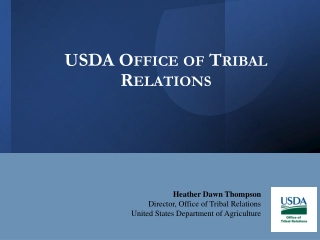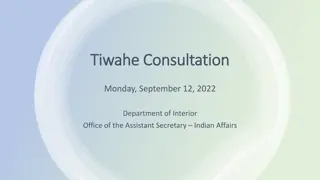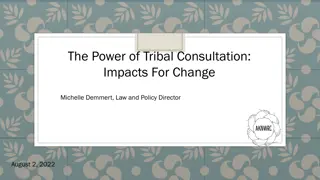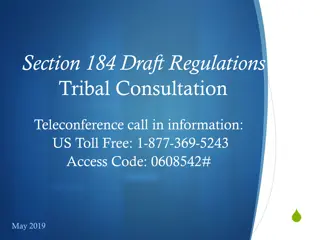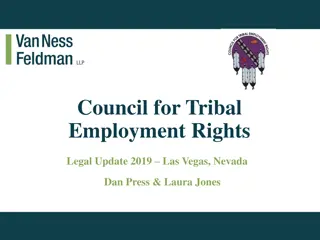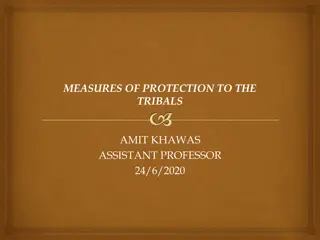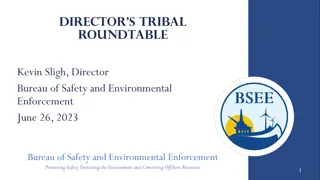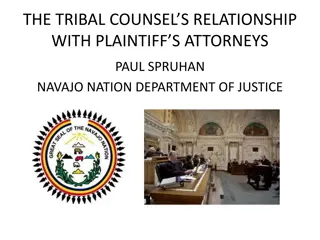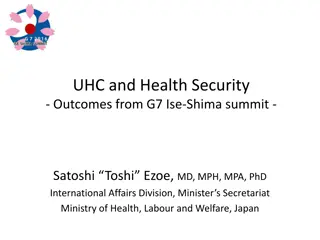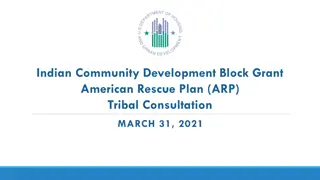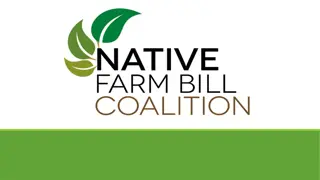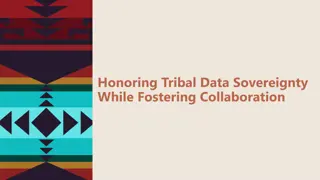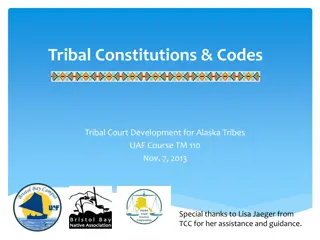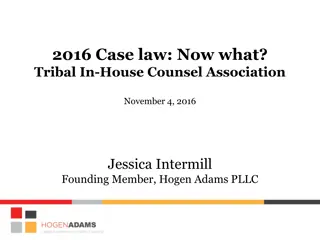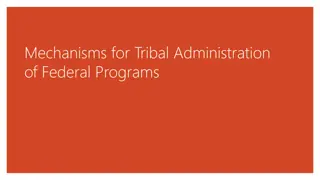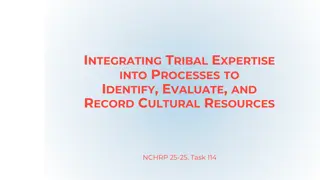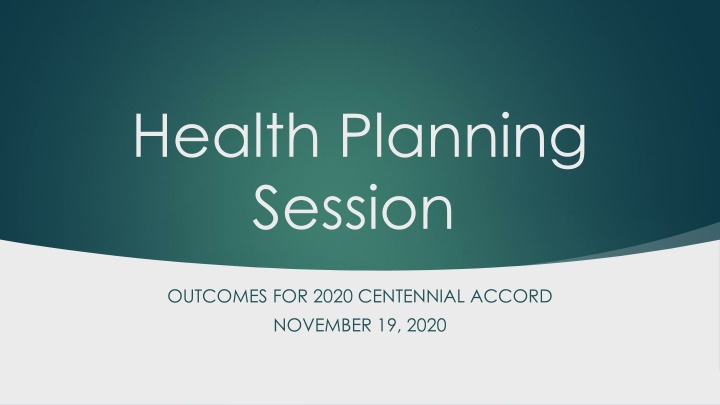
Tribal Sovereignty and Jurisdiction in Health Planning
In the context of a health planning session for the 2020 Centennial Accord, the focus is on ensuring that agencies treat tribes as government entities, respecting tribal sovereignty and jurisdiction. Tribal nations have inherent authority over their members and territory, including the power to provide essential services and regulate internal affairs. The discussion also touches on the implications of PL 280 on tribal jurisdiction and the importance of addressing health issues such as the Behavioral Health Crisis System and opioid response within tribal communities.
Download Presentation

Please find below an Image/Link to download the presentation.
The content on the website is provided AS IS for your information and personal use only. It may not be sold, licensed, or shared on other websites without obtaining consent from the author. If you encounter any issues during the download, it is possible that the publisher has removed the file from their server.
You are allowed to download the files provided on this website for personal or commercial use, subject to the condition that they are used lawfully. All files are the property of their respective owners.
The content on the website is provided AS IS for your information and personal use only. It may not be sold, licensed, or shared on other websites without obtaining consent from the author.
E N D
Presentation Transcript
Health Planning Session OUTCOMES FOR 2020 CENTENNIAL ACCORD NOVEMBER 19, 2020
Ensuring Agencies are Treating Tribes as Government TRIBAL SOVEREIGNTY
Tribal Jurisdiction and Authority Tribes possess the inherent sovereign authority to provide services for their community members including, but not limited to: public health services, preventative services, inpatient treatment, and involuntary commitment proceedings through their tribal courts.
Tribal Jurisdiction and Authority Tribal nations have inherent sovereignty over both their members and their territory. United States v. Mazurie, 419 U.S. 544, 557 (1995). The sovereignty retained by Tribes includes the power of regulating their internal and social relations, United State v. Wheeler, 435 U.S. 313,322 (1978).
Tribal Jurisdiction and PL 280 PL 280 does not remove a Tribe s sovereign authority. Bryan v. Itasca Cnty, 426 U.S. 373. PL 280 does not grant authority to states to regulate civil activities in Indian country. Bryan v. Itasca Cnty, 426 U.S. 373. PL 280 did not remove the criminal or civil jurisdiction of tribal courts over activities in Indian country, but rather provided concurrent jurisdiction with state courts. Walker v. Rushing, 898 F.2d 672, 675 (8th Cir. 1990).
Tribal Jurisdiction and PL 280 The Washington State Supreme Court has reached the same conclusion in State v. Schmuck, 121 Wash. 2d 373(1993): In the area of civil regulatory authority, the United States Supreme Court observed that nothing in the text of Public Law 280 addresses the removal of tribal authority, as would be expected if Congress intended such a sweeping change in the status of tribal Government. Citing to Bryan, 426 U.S. at 381.
2019 Centennial Accord Health Issues Addressing issues with the Behavioral Health Crisis System Support of Funding Foundational Public Health Services Opioid Response Tribal Data IHCP Workforce Development Continue funding and coordination for Tribal Youth Prevention Programs Ensuring Agencies are Treating Tribes as Government
2020 Accomplishments Governor s Indian Health Advisory Council provided advisory role in state legislation: Indian Behavioral Health Act The Long-Term Services and Support Act Passage of the Indian Behavioral Health Act Washington Tribal and UIHP COVID-19 Response that Received National Recognition
Addressing Issues in the Behavioral Health System PASSAGE OF INDIAN BEHAVIORAL HEALTH ACT
Overview of the Indian Behavioral Health Act Passage of SSB 6259- the Indian Behavioral Health Act in Washington State March 2020 made the following changes to the crisis system: Requires Tribal Court Orders for ITA are recognized and honored Allows Tribes to file and/or intervene in ITA Court proceedings Requires notification of IHCP of ITA proceeds for Tribal Member/Citizen Allows IHCP and Tribal Courts to receive mental health records Established Tribal DCR Appointed through a process with HCA and Tribe Paid by the HCA to the Tribe for ITA services (*in development)
Support of Funding Foundational Public Health Services FUNDING TRIBAL FOUNDATIONAL PUBLIC HEALTH SERVICES
TRIBAL PUBLIC HEALTH MATERNAL - INFANT HEALTH SERVICES CLINICAL PREVENTIVE SERVICES PREVENTION AND COMMUNICABLE ENVIRONMENTAL PUBLIC HEALTH DISEASE HEALTH PROMOTION CONTROL Foundational Capabilities Assessment & Epidemiology Emergency Preparedness and Response Communications Policy and Planning Leadership and Organization Competencies Health Equity and Cultural Responsiveness Community Partnership Development
Tribal Youth Prevention Programs ENSURING FUNDING FOR THE WORK
Tribal Data Soveriegnty
Issues Issues Tribes and UIHPs need additional health data technology systems and infrastructure to adequately manage their public health data Tribes and UIHPs need increased access to Washington State information systems that include data related to the health of AI/ANs and tribal communities State (and federal) data systems are used for allocating funds and planning programs, but they include incomplete and inaccurate data on AI/AN due to misclassification and underreporting Tribal sovereignty must be respected so Tribes can control the collection, reporting, and use of their data
Work Completed Work Completed Facilitated access to Tribes and UIHPs to state public health databases RHINO (Washington Rapid Health Information Network) WDRS (Washington Disease Reporting System) Worked with DOH to develop 29 reports in WDRS for COVID cases Working with Tribal Data Sovereignty Workgroup to expand access to state data systems Seeking resources to acquire population health information management systems for Tribes and UIHPs
Next Steps Next Steps Continue Tribal Data Sovereignty Workgroup Expand access to state data systems Build on Tribal data capabilities Identify resources for investment in tribal and UIHP information systems technology, infrastructure and workforce development to strengthen tribal public health data management capabilities Develop legal mechanisms and administrative policies and procedures to assure protection of tribal data in tribal information systems and non-tribal information systems 18 What else?
IHPC Workforce Development CHAP AND OTHER PROVIDERS
Community Health Aids, Behavioral Health Aids and Dental Health Aid Therapist Community Health Aids (CHA,) Behavioral Health Aids (BHA) and Dental Health Aid Therapists (DHAT) can fill a gap in workforce at Tribes. Services provided by these provider types need to be billable under the Medicaid program We believe there are already similar certified providers that show these provider types just need to have a certification process with the state developed in order for payment to happen: BHA same/similar to Peer Counselors, same training. Authorized provider for maternity support services
2020 Centennial Accord Health Issues COVID-19 Impact on Budgets and Workforce Equitable Distribution of Appropriate COVID-19 Vaccines


